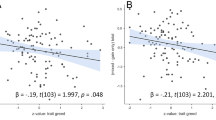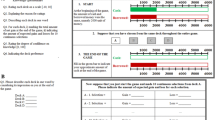Abstract
Previous research has shown mixed results regarding the effects of cognitively draining tasks, sometimes reporting that the depletion of cognitive resources increases risk taking and other times reporting that depletion leads to increases in risk aversion. Additionally, evidence has been provided demonstrating that both winning and losing can increase future risk-taking. This experiment was designed to assess the interaction between cognitive resource depletion and outcomes in blackjack on risky decision making. A 2 × 2 between subjects design was employed in which 81 university undergraduates were randomized to either a cognitive resource depletion condition or control condition and then a winning condition or losing condition. Participants completed a self-report measure of decision making and then a completed a task in which they could make actual wagers to win a lottery. Evidence is provided for the conclusion that people become risk averse to lottery style gambles after cognitive depletion and losing. Research and clinical implications are discussed.


Similar content being viewed by others
Notes
Please note that the participants would, in fact, win the $50 if they had drawn the orange bead; however, no participants drew the orange bead. This is perhaps not surprising given the low probability of drawing it.
References
Baumeister, R. F., Bratslavsky, E., Muraven, M., & Tice, D. M. (1998). Ego-depletion: Is the active self a limited resource? Journal of Personality and Social Psychology, 74, 1252–1265.
Baumeister, R. F., Muraven, M., & Tice, D. M. (2000). Ego depletion: A resource model of volition, self-regulation, and controlled processing. Social Cognition, 18(2), 130–150.
Baumeister, R. F., & Vohs, K. D. (2007). Self-regulation, ego-depletion, and motivation. Social and Personality Psychology Compass, 1, 1–14.
Blais, A. R., & Weber, E. (2006). A domain-specific risk-taking (DOSPERT) scale for adult populations. Judgment and Decision Making, 1(1), 2006.
Bruyneel, S. D., Dewitte, S., Franses, P. H., & Dekimpe, M. G. (2009). I felt low and my purse feels light: Depleting mood regulation attempts affect risk decision making. Journal of Behavioral Decision Making, 22(2), 153–170.
Coval, J. D., & Shumway, T. (2005). Do behavioral biases affect prices? The Journal of Finance, 60(1), 1–34.
Cummins, L. F., Nadorff, M. R., & Kelly, A. E. (2009). Winning and positive affect can lead to reckless gambling. Psychology of Addictive Behaviors, 23(2), 287.
Demaree, H. A., Burns, K. J., DeDonno, M. A., Agarwala, E. K., & Everhart, D. E. (2012). Risk dishabituation: In repeated gambling, risk is reduced following low-probability, "surprising," events (wins or losses). Emotion, 12, 495–502.
Freeman, N., & Muraven, M. (2010). Self-control depletion leads to increased risk taking. Social Psychological and Personality Science, 1(2), 175–181.
Gainsbury, S. M., & Blaszczynski, A. (2010). The appropriateness of using laboratories and student participants in gambling research. Journal of Gambling Studies, 27(1), 83–97.
Isen, A. M., & Patrick, R. (1983). The effect of positive feelings on risk-taking: When the chips are down. Organizational Behavior and Human Decision Processes, 31, 194–202.
Langhe, B., Sweldens, S., Van Osselaer, S., & Tuk, M. (2008). The emotional information processing system is risk averse: Ego-depletion and investment behavior. ERIM Report Series Reference no. ERS-2008-064-MKT
Leopard, D. (1978). Risk preference in consecutive gambling. Journal of Experimental Psychology: Human Perception and Performance, 4, 521–528.
Muraven, M., & Baumeister, R. F. (2000). Self-regulation and depletion of limited resources: Does self-control resemble a muscle? Psychological Bulletin, 126(2), 247.
Nygren, T. T., Isen, A. M., Taylor, P. J., & Dulin, J. (1996). The influence of positive affect on the decision rule in risk situations: Focus on outcome (and especially avoidance of loss) rather than probability. Organizational Behavior and Human Decision Processes, 66, 59–72.
Osborn, R. N., & Jackson, D. H. (1988). Leaders, riverboat gamblers, or purposeful unintended consequences in the management of complex, dangerous technologies. Academy of Management Journal, 31, 924–947.
Schmeichel, B. J., & Vohs, K. (2009). Self-affirmation and self-control: Affirming core values counteracts ego depletion. Journal of Personality and Social Psychology, 96(4), 770.
Thaler, R. H., & Johnson, E. J. (1990). Gambling with the house money and trying to break even: The effects of prior outcomes on risky choice. Management Science, 36, 643–660.
Unger, A., & Stahlberg, D. (2011). Ego-depletion and risk behavior: Too exhausted to take a risk. Social Psychology, 42(1), 28.
Vohs, K. D., & Heatherton, T. F. (2000). Self-regulatory failure: A resource-depletion approach. Psychological Science, 11(3), 249–254.
Author information
Authors and Affiliations
Corresponding author
Rights and permissions
About this article
Cite this article
Kostek, J., Ashrafioun, L. Tired Winners: The Effects of Cognitive Resources and Prior Winning on Risky Decision Making. J Gambl Stud 30, 423–434 (2014). https://doi.org/10.1007/s10899-013-9365-x
Published:
Issue Date:
DOI: https://doi.org/10.1007/s10899-013-9365-x




